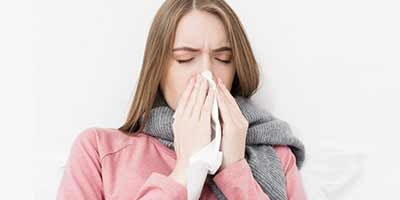Tips To Prevent Nasal Polyps!
Nasal polyps are soft, painless, noncancerous growths on the lining of your nasal passages or sinuses. They hang down like teardrops or grapes. They result from chronic inflammation and are associated with asthma, recurring infection, allergies, drug sensitivity or certain immune disorders.
Small nasal polyps may not cause symptoms. Larger growths or groups of nasal polyps can block your nasal passages or lead to breathing problems, a lost sense of smell and frequent infections.
Nasal polyps can affect anyone, but they're more common in adults. Medications can often shrink or eliminate nasal polyps, but surgery is sometimes needed to remove them. Even after successful treatment, nasal polyps often return.
Symptoms
- Nasal polyps are associated with irritation and swelling (inflammation) of the lining of your nasal passages and sinuses that lasts more than 12 weeks (chronic sinusitis).
- However, it's possible to have chronic sinusitis without nasal polyps.
- Nasal polyps themselves are soft and lack sensation, so if they're small, you may not be aware you have them. Multiple growths or a large polyp may block your nasal passages and sinuses.
Common signs and symptoms of chronic sinusitis with nasal polyps include:
- A runny nose
- Persistent stuffiness
- Postnasal drip
- Decreased or absent sense of smell
- Loss of sense of taste
- Facial pain or headache
- Pain in your upper teeth
- A sense of pressure over your forehead and face
- Snoring
- Frequent nosebleeds
When to see a doctor
See your doctor if your symptoms last more than 10 days. Symptoms of chronic sinusitis and nasal polyps are similar to those of many other conditions, including the common cold.
Risk factors
- Any condition that triggers long-term irritation and swelling (inflammation) in your nasal passages or sinuses, such as infections or allergies, may increase your risk of developing nasal polyps.
- Conditions often associated with nasal polyps include:
- Asthma, a disease that causes the airway to swell (inflame) and narrow
- Aspirin sensitivity
- Allergic fungal sinusitis, an allergy to airborne fungi
- Cystic fibrosis, a genetic disorder that results in abnormally thick, sticky fluids in the body, including thick mucus from nasal and sinus linings
- Churg-strauss syndrome (eosinophilic granulomatosis with polyangiitis), a rare disease that causes the inflammation of blood vessels
- Vitamin d deficiency, which occurs when your body doesn't have enough vitamin d
- Your family history also may play a role. There's some evidence that certain genetic variations associated with immune system function make you more likely to develop nasal polyps.
Complications
- Nasal polyps can cause complications because they block normal airflow and fluid drainage, and also because of the long-term irritation and swelling (inflammation) underlying their development.
- Potential complications include:
- Obstructive sleep apnea. This is a potentially serious condition in which you stop and start breathing frequently during sleep.
- Asthma flare-ups. Chronic sinusitis can worsen asthma.
- Sinus infections. Nasal polyps can make you more susceptible to sinus infections that recur often.
Prevention
- You may help reduce your chances of developing nasal polyps or having nasal polyps recur after treatment with the following strategies:
- Manage allergies and asthma. Follow your doctor's treatment recommendations. If your symptoms aren't well controlled, talk to your doctor about changing your treatment plan.
- Avoid nasal irritants. As much as possible, avoid breathing airborne substances that are likely to contribute to swelling or irritation in your nose and sinuses, such as allergens, tobacco smoke, chemical fumes, and dust and fine debris.
- Practice good hygiene. Wash your hands regularly and thoroughly. This is one of the best ways to protect against bacterial and viral infections that can cause inflammation of the nasal passages and sinuses.
- Humidify your home. Using a humidifier may help moisten your breathing passages, improve the flow of mucus from your sinuses, and help prevent blockages and inflammation. Clean the humidifier daily to prevent bacteria from growing.
- Use a nasal rinse. Use a saltwater (saline) spray or nasal wash to rinse your nasal passages. This may improve mucus flow and remove allergens and other irritants.
- You can purchase over-the-counter saline sprays or nasal wash kits with devices, such as a neti pot or squeeze bottle, to administer a rinse.
- Use water that's distilled, sterile, previously boiled for one minute and cooled, or filtered using a filter with an absolute pore size of 1 micron or smaller to make up the irrigation solution. Rinse the irrigation device after each use with the distilled, sterile, previously boiled, or filtered water and leave it open to air-dry.
Treatment
- Chronic sinusitis, with or without polyps, is a challenging condition to clear up completely.
- You'll work with your health care team to develop the appropriate long-term treatment plan to manage your symptoms and to treat factors, such as allergies, that may contribute to chronic swelling (inflammation).
- The treatment goal for nasal polyps is to reduce their size or eliminate them. Medications are usually the first approach. Surgery may sometimes be needed, but it may not provide a permanent solution because polyps tend to recur.



+1.svg)
